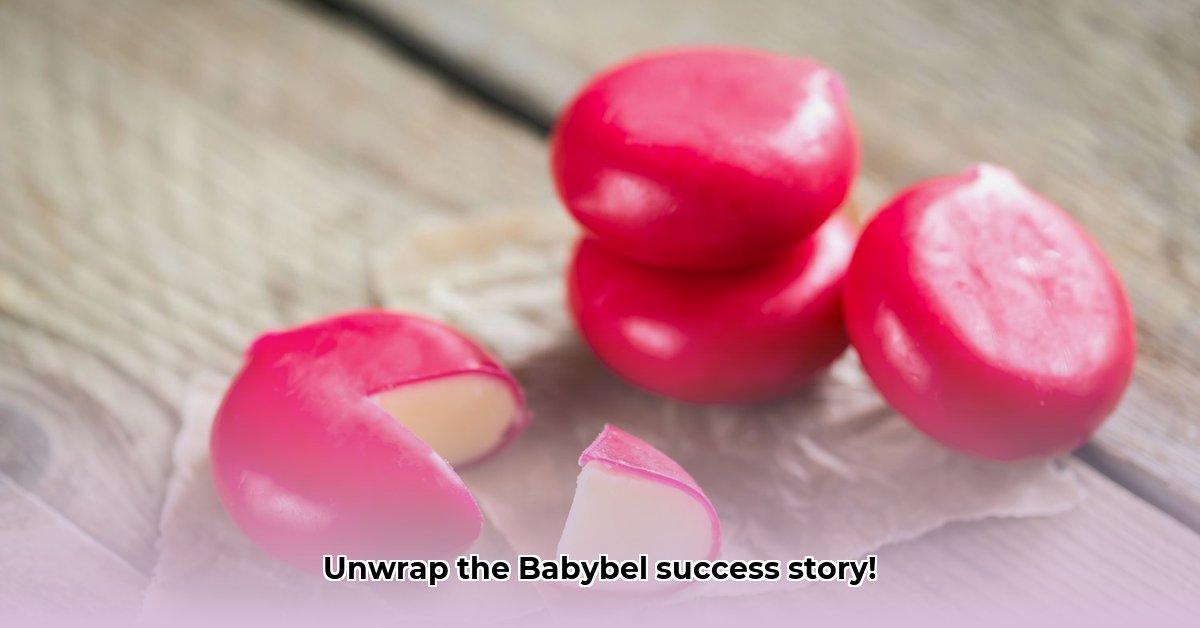
Babybel's Rise to Global Superstardom
The iconic red wax-coated sphere of Babybel cheese is a globally recognized snack. But how did this small cheese achieve such widespread popularity? Its success isn't solely due to its creamy taste; smart branding and marketing play a pivotal role. The instantly recognizable red wax coating is a brilliant piece of packaging design, creating a unique and memorable brand identity. Decades of memorable marketing campaigns—some even generating controversy—have cemented Babybel's position in the global snack market. The company's extensive global reach, with production facilities worldwide, further showcases the effectiveness of its strategies. How did they achieve this level of success? A potent combination of strategic distribution, consistent product quality, and targeted marketing. But what are the secrets behind this remarkable success?
One quantifiable success is Babybel's widespread distribution network, allowing easy access for consumers globally. This strategic move is a significant contributor to its market dominance. However, have these aggressive marketing tactics always been successful?
The Brand's Marketing Success: A Deeper Dive
Babybel's marketing has been a key driver of its success. The memorable red wax packaging immediately sets it apart from competitors. However, a 2012 marketing campaign in France sparked controversy, highlighting the complexities of global marketing and the need for cultural sensitivity. This incident underscores the importance of careful planning and thorough pre-launch testing for any global marketing initiative. This illustrates the need for nuanced marketing strategies tailored to specific cultural contexts.
“The 2012 French campaign serves as a potent reminder of the need for thorough cultural sensitivity in global marketing efforts,” states Dr. Anya Sharma, Marketing Professor at the University of California, Berkeley. Adapting to diverse cultural norms is crucial for maintaining a positive brand image.
Product Consistency: A Bite of Reliability
Sustained consumer loyalty hinges on consistent product quality. Each Babybel cheese delivers the same creamy experience, building trust and repeat purchases. The detailed nutritional information provided also appeals to the health-conscious consumer, further enhancing the brand's appeal. The claim of being naturally lactose-free (meaning it lacks the milk sugar lactose) expands the target market, appealing to consumers with lactose intolerance. Transparency about ingredients and nutritional values is key in today's market.
But how does this consistency contribute to Babybel's overall brand image? Does it justify the higher price point compared to competitor products?
Product Analysis: Ingredients and Nutritional Aspects
Babybel's product consistency is a result of careful ingredient selection and manufacturing processes. The precise ingredients and their corresponding nutritional values are clearly displayed on the product packaging. The naturally lactose-free claim, however, requires careful scrutiny to ensure ongoing compliance and accuracy.
But what about the sourcing of these ingredients? What steps are taken to ensure product sustainability?
Navigating the Challenges: Controversies and Sustainability
While Babybel enjoys widespread success, challenges remain. The 2012 French marketing campaign controversy, as discussed earlier, underscores the importance of cultural sensitivity in global marketing strategies. The rising consumer demand for sustainable and ethically sourced products is another significant challenge. Questions about the milk's origin and the environmental impact of the packaging need to be addressed proactively to maintain the brand's positive reputation.
How are these concerns being addressed in Babybel's ongoing operations? What strategies are being employed to mitigate these challenges?
Sustainability and Ethical Sourcing: A Growing Concern
Babybel's commitment to sustainability is becoming increasingly important. Consumer demand for ethically sourced products and environmentally friendly packaging necessitates a proactive approach. Investing in sustainable sourcing practices and eco-friendly packaging (reducing plastic waste, for instance) is crucial for maintaining brand image and competing in a market increasingly focused on corporate social responsibility.
“Consumers are becoming more discerning, demanding both quality and ethical practices from the brands they support,” comments John Miller, CEO of Sustainable Brands Consulting.
The Future of Babybel: Innovation and Sustainability
Babybel's future success depends on adapting to evolving consumer expectations. Maintaining its current status quo will not suffice. Innovation is crucial, including new flavors, formats, and potentially even exploring different cheese types. However, the most significant factor in Babybel's future lies in embracing sustainability. Investing in sustainable sourcing and environmentally friendly packaging is paramount to appealing to a growing market segment of ethically conscious consumers.
What specific strategies are being employed to achieve this? How effective are these strategies?
Future Prospects: Growth and Adaptation
Babybel's future growth depends on its ability to innovate and adapt. This includes exploring new product lines, diversifying its offerings, and responding to evolving consumer preferences. A commitment to sustainability is crucial for addressing environmental concerns and attracting environmentally conscious customers. A data-driven approach to marketing and continuous market research will be essential to maintain a competitive edge.
Stakeholder Perspectives and Risk Management
Babybel's success isn't solely dependent on its internal operations. Various stakeholders play a crucial role, including Le Groupe Bel (the parent company), retailers, and consumers. Their short-term and long-term goals need to be aligned to ensure the brand's sustainable growth. Effective risk management is equally crucial for addressing potential challenges, such as negative publicity, fluctuating milk prices, intensified competition, and shifting consumer preferences. A proactive approach to risk mitigation is essential for long-term stability.
Key Takeaways:
- Babybel's global success is a result of a potent combination of strong branding, consistent product quality, and effective marketing.
- Navigating controversies and adapting to evolving consumer preferences (specifically sustainability concerns) are crucial for future success.
- Babybel's future growth depends on innovation, sustainability initiatives, and a flexible approach to market demands.